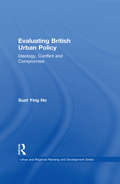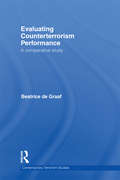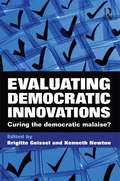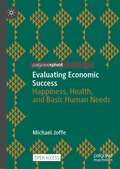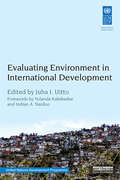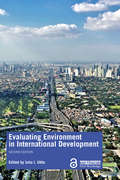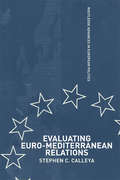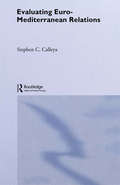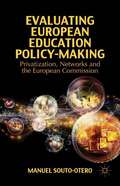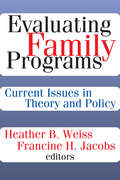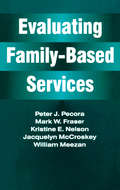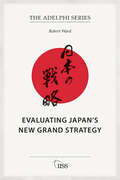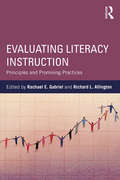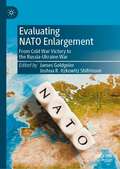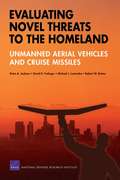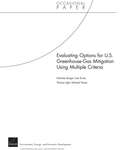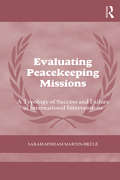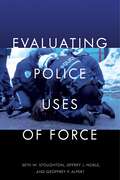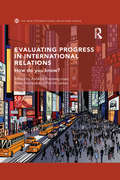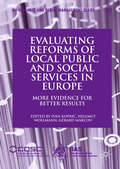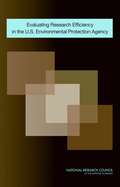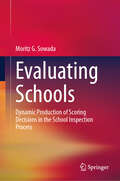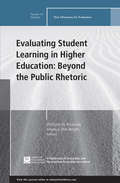- Table View
- List View
Evaluating British Urban Policy: Ideology, Conflict and Compromise (Urban and Regional Planning and Development Series)
by Suet Ying HoSince the Conservative government of the late 70s introduced its stringent spending policy, a 'value for money' ideology has dictated most new approaches to policy management. As a result, monitoring and evaluation have become an integral part in the policy process. Focusing on the experience of British Urban Policy, this book examines the theoretical and practical issues in the monitoring or evaluation of public policy. It argues that as a result of the 'value for money' ideology influencing urban policy in Britain, various conflicts have arisen in both policy and implementation, and compromises have had to be made. By exploring the experiences of monitoring and evaluating urban policy, the book examines key issues such as changing approaches, the interface between monitoring and evaluation, and the utilization of monitoring information and evaluation studies. It concludes that a long-term evaluation strategy is required in order to improve the utility value of evaluation studies vis-a-vis policy formulation at the national level and implementation at the local level.
Evaluating Counterterrorism Performance: A Comparative Study (Contemporary Terrorism Studies)
by Beatrice de GraafThis book offers a new model for measuring the success and impact of counterterrorism strategies, using four comparative historical case studies. The effectiveness of counterterrorism measures is hard to assess, especially since the social impact of terrorist attacks is a fundamental and complex issue. This book focuses on the impact of counterterrorist measures by introducing the concept of the performative power of counterterrorism: the extent to which governments mobilize public and political support - thereby sometimes even unwittingly assisting terrorists in creating social drama. The concept is applied to counterterrorism in the Netherlands, Italy, the Federal Republic of Germany and the United States in the 1970s. Based on in-depth case study research using new primary sources and interviews with counterterrorist officials and radicals, a correlation is established between a low level of performative power and a decline of terrorist incidents. This is explored in terms of the link between social drama (as enhanced by counterterrorist measures) and ongoing radicalization processes. This book demonstrates that an increase in visible and intrusive counterterrorist measures does not automatically lead to a more effective form of counterterrorism. In the open democracies of the west, not transforming counterterrorism into a performance of power and repression is at least as important as counterterrorism measures themselves. This book will be of much interest to students of terrorism and counter-terrorism, discourse analysis, media and communication studies, conflict studies and IR/Security Studies in general.
Evaluating Democratic Innovations: Curing the Democratic Malaise?
by Kenneth Newton Brigitte GeisselIn the face of increasing political disenchantment, many Western governments have experimented, with innovations which aim to enhance the working and quality of democracy as well as increasing citizens’ political awareness and understanding of political matters. This text is the most comprehensive account of these various democratic innovations. Written by an outstanding team of international experts it examines the theories behind these democratic innovations, how they have worked in practice and evaluates their success or failure. It explains experiments with new forms of democratic engagement such as: Direct Democracy Deliberative Democracy Co-Governance E-Democracy Drawing on a wide variety of theoretical perspectives and with a broad range of case studies, this is essential reading for all students of democratic theory and all those with an interest in how we might revitalise democracy and increase citizen involvement in the political process.
Evaluating Economic Success: Happiness, Health, and Basic Human Needs (Wellbeing in Politics and Policy)
by Michael JoffeThis open access book argues that a new policy approach is required in order to tackle the numerous problems the world is currently facing. The priority should be on achieving better outcomes for people, especially those facing deprivation or precariousness, by meeting their basic needs. In order to achieve this, the book develops a monitoring system that can act as an objective, an incentive, and a criterion of success for policy makers at all levels of government and in civil society, as well as providing information to guide specific actions. In doing so, the book aims to promote good health and positive social functioning by providing a new approach to help assess how well basic human needs are being met. This involves monitoring the outcomes of the economy that ought to satisfy these needs. It will appeal to all those interested in public policy, official statistics and monitoring, public health and wellbeing, as well as practitioners.
Evaluating Elections
by R. Michael Alvarez Thad E. Hall Lonna Rae AtkesonIn competitive and contested democratic elections, insuring integrity is critical. Evaluating Elections shows why systematic analysis and reporting of election performance is important and how data-driven performance management can be used by election officials to improve elections. The authors outline how performance management systems can function in elections and their benefits for voters, candidates, and political parties. Journalists, election administrators, and even candidates often ask whether recent elections were run well, whether there were problems in the administration of a particular state's elections, and how well elections were run across the country. The authors explain that such questions are difficult to answer because of the complexity of election administration and because there is currently no standard or accepted framework to assess the general quality of an election.
Evaluating Empire and Confronting Colonialism in Eighteenth-Century Britain
by Jack P. GreeneThis volume comprehensively examines how metropolitan Britons spoke and wrote about the British Empire during the short eighteenth century, from about 1730 to 1790. The work argues that following several decades of largely uncritical celebration of the empire as a vibrant commercial entity that had made Britain prosperous and powerful, a growing familiarity with the character of overseas territories and their inhabitants during and after the Seven Years' War produced a substantial critique of empire. This critique evolved out of a widespread revulsion against the behaviours exhibited by Britons overseas and built on a language of 'otherness' that metropolitans had used since the beginning of overseas expansion to describe its participants, the societies and polities that Britons abroad constructed in their new habitats. It used the languages of humanity and justice as standards to evaluate and condemn the behaviours of both overseas Britons and subaltern people in the British Empire, whether in India, the Americas, Africa or Ireland.
Evaluating Environment in International Development
by Juha I. Uitto Yolanda Kakabadse Indran A. NaidooMore than twenty years after the Earth Summit was held in Rio de Janeiro in 1992, both national and international actors in governmental and nongovernmental fields are still searching for insights into how sustainable development can be advanced and environmental concerns incorporated into the development agenda more effectively. Moreover, climate change has emerged as a preeminent challenge to both the environment and to development. Evaluating Environment in International Development provides international perspectives and in-depth knowledge of evaluating development and the environment and applies evaluation knowledge to climate change mitigation and adaptation. The book focuses on the approaches and experiences of leading international organizations, not-for-profits, and multilateral and bilateral aid agencies to illustrate how systematic evaluation is an essential tool for providing evidence for decision-makers. It provides novel and in-depth perspectives on evaluating environment and sustainability issues in developing countries. Moving beyond projects and programmes, it considers aspects such as evaluating normative work on the environment and evaluating environmental consequences of economic and social development efforts. This original collection should be of interest to scholars of environment studies, development studies, international relations, sustainable development and evaluation, as well as practitioners in international organizations and development and environmental NGOs.
Evaluating Environment in International Development
by Juha I. UittoThis book provides novel and in-depth perspectives on evaluating environment and sustainability issues in developing countries. Evaluating Environment in International Development focuses on the approaches and experiences of leading international organizations, not-for-profits, and multilateral and bilateral aid agencies to illustrate how systematic evaluation is an essential tool for providing evidence for decision-makers. Moving beyond projects and programmes, it explores normative work on the environment as well as environmental consequences of economic and social development efforts. This new edition reflects on the 2030 Agenda for Sustainable Development and Sustainable Development Goals and considers how they have influenced efforts in a wide range of countries and what the implications are for evaluation. It also explores ways in which Big Data and geospatial approaches might be utilized. Significantly updated throughout to reflect recent developments in climate change research, and on the implications of the 2020 pandemic, this volume will be of great interest to students and scholars of environment studies, development studies, international relations, sustainable development and evaluation, as well as practitioners in international organizations and development and environmental NGOs.
Evaluating Euro-Mediterranean (Routledge Advances In European Politics Ser. #Vol. 22)
by Stephen CalleyaFirst Published in 2004. Routledge is an imprint of Taylor & Francis, an informa company.
Evaluating Euro-Mediterranean Relations (Routledge Advances in European Politics #Vol. 22)
by Stephen C. CalleyaWhat are the prospects for the future of the Euro-Mediterranean area and what relevant role can the Euro-Mediterranean Partnership (EMP) play in the future? After decades of a Mediterranean policy that was actually more focused on improving economic relations between Europe and the Mediterranean riparian states than anything else, the EU launched a more comprehensive Mediterranean policy in November 1995, the so-called Euro-Mediterranean Partnership (EMP) that also embraced political and security relations and socio-cultural relations.As the tenth anniversary of this partnership approaches, this book discusses measures that could help transform this multilateral initiative from a boundary management exercise to a process that focuses more on encouraging boundary transformation. Euro-Mediterranean initiatives that are in the pipeline, such as the enhanced political dialogue, the Charter for Peace and Stability, the creation of a free trade area, and justice and home affairs co-operation, are also discussed.
Evaluating European Education Policy-Making
by Manuel Souto-OteroThis collection is an inside look at European Commission policy-making in education and the privatization of policy-making in the European Union. Along with contributions from leading academics in the field of European educational policy and policy-sociology, this book also introduces the 'absent voices' in the policy privatization debate: policy consultants and policy-makers. Contributors combine theoretical concepts with empirical research to consider the differences between the EuropeanCommission policy privatization process and similar processes in countries around the world. Evaluating European Education Policy-Making provides the first empirical contribution to the study of the private/public policy networks that the Commission uses for the co-production of its 'statework' in the area of education, and ultimately addresses fundamental questions of democracy and accountability.
Evaluating Family Programs: Current Issues in Theory and Policy
by Francine H. Jacobs Heather B. WeissThe diverse composition of American families and changing ways of raising our children have become subjects of intense scrutiny by researchers and policymakers in recent years. Shifting demographics and work patterns, growing numbers of women in the work force, teenage pregnancy, single-parent families, and the deinstitutionalization of the elderly, disabled, and mentally ill--all these trends have significantly affected family life. Evaluating Family Programs effectively bridges the gap between researchers and practitioners in order to bring practical, understandable advice to providers of family programs and to program funders and policymakers.Heather B. Weiss and Francine H. Jacobs have collected in this volume works which move outside the traditional approaches of their disciplines to create new models for delivering and evaluating services. This sets a mood of genuine inquiry and excitement about successful aspects of programs while maintaining openness about the limitations of both research and practice. By expanding the research model, this work is an attempt to understand reciprocal influences of extended family, culture, community, and social institutions. It urges those who advocate program accountability to understand that not all types of evaluations are appropriate for all programs, and it notes that limitations in current evaluation technologies make it difficult to evaluate outcomes.Evaluating Family Programs reminds the reader that in order to develop sound family policy we must look at children and families in context. Beacuse policymakers, program administrators, and informed citizens have come to rely more upon the results of evaluation research, we must improve our methods while not losing sight of its limitations. It is a thought-provoking contribution to the efforts of those who seek to support the American family with compassion, understanding, and realism.
Evaluating Family-Based Services
by Mark W. Fraser Peter J. Pecora William Meezan Kristine E. Nelson Jacquelyn McCroskeyFirst Published in 2018. Routledge is an imprint of Taylor & Francis, an Informa company.
Evaluating Japan’s New Grand Strategy (Adelphi series)
by Robert WardGeopolitical stresses in the Indo-Pacific are increasing and intensifying. These stresses derive from China’s more assertive regional behaviour; growing alignments between China and Russia on the one hand and Russia and North Korea on the other; and most recently from the apparent recalibration of United States foreign policy under the second Trump administration. They have magnified Japan’s significance as a strategic actor both in the Indo-Pacific and beyond.As such, it is of global importance whether Japan can meet the grand-strategic goals that it established in its 2022 National Security Strategy, National Defense Strategy and Defense Buildup Program. This Adelphi book evaluates Japan’s new grand strategy, considering whether it and associated reforms are sufficiently robust to fulfil Japan’s goal of ensuring its security even in the scenario of a Chinese attack on Taiwan.
Evaluating Literacy Instruction: Principles and Promising Practices
by Richard L. Allington Rachael E. GabrielThis must-read book for all literacy educators illuminates the intersection of research on literacy instruction and teacher evaluation. Since 2009, 46 states have changed or revised policies related to evaluating teachers and school leaders. In order for these new policies to be used to support and develop effective literacy instruction, resources are needed that connect the best of what is known about teaching literacy with current evaluation policies and support practices. A major contribution to meeting this need, the volume brings together a range of perspectives on tools, systems, and policies for the evaluation of teaching, organized into two sections: • Crafting Systems and Policies for Evaluating Literacy Instruction • Examples of Alternative Systems/Approaches for Evaluating Literacy Instruction Across the text, expert scholars in the field emphasize the need for literacy professionals to do more than merely apply generic observation instruments for teacher evaluation, but also to consider how these tools reflect professional values, how elements of effective literacy instruction can be unearthed or included within them, and how teacher evaluation systems and policies can be used to increase students’ opportunities to develop literacy.
Evaluating NATO Enlargement: From Cold War Victory to the Russia-Ukraine War
by James Goldgeier Joshua R. Itzkowitz ShifrinsonMobilizing an interdisciplinary group of scholars and practitioners, this book reviews the history and consequences of NATO’s post-Cold War enlargement into Central and Eastern Europe. It offers a nuanced discussion of the merits and drawbacks of NATO enlargement across the different actors involved and compares the results of the policy against potential alternatives that were not chosen. Particular attention is given to NATO enlargement’s influence on the course of U.S. foreign policy, democracy and security in Central and Eastern Europe, NATO’s own development as a political and military institution, and relations with China and Russia (including the 2022 Russia-Ukraine War). Written for an engaged audience, the book is designed to appeal to students, researchers, and policymakers alike while offering both policy insights and avenues for future scholarship.
Evaluating Novel Threats to the Homeland
by David R. Frelinger Michael J. Lostumbo Robert W. Button Brian A. JacksonChanges in technology and adversary behavior will invariably produce new threats that must be assessed by defense and homeland security planners. An example of such a novel threat is the use of cruise missiles or unmanned aerial vehicles (UAVs) by terrorist groups. Individual threats cannot be assessed in isolation, however, since adversaries always have many options for staging attacks. To examine this threat, RAND utilized a ?red analysis of alternatives? approach, wherein the benefits, costs, and risks of different options are considered from the point of view of a potential adversary. For several types of attacks, the suitability of these systems was compared against other options. This approach can help defense planners understand how the capabilities that different attack modes provide address key adversary operational problems. Given the insights this analysis produced about when these systems would likely be preferred by an attacker, RAND explored defensive options to address the threat. UAVs and cruise missiles represent a ?niche threat? within a larger threat context; therefore, defenses were sought that provide common protection against both this and other asymmetric threats. The monograph concludes with a discussion of cross-cutting lessons about this threat and the assessment of novel threats in general.
Evaluating Options for U.S. Greenhouse-Gas Mitigation Using Multiple Criteria
by Michael Toman Thomas Light Nicholas Burger Liisa EcolaChoosing policy responses to mitigate greenhouse gases (GHGs) is one of the great challenges that the United States faces. It will require balancing cost-effectiveness and other objectives that reflect the institutional and political realities of passing major federal legislation with widespread impacts on U.S. producers and consumers. This paper develops a framework for evaluating U.S. GHG-mitigation policy that balances several criteria.
Evaluating Peacekeeping Missions: A Typology of Success and Failure in International Interventions (Cass Series on Peacekeeping)
by Sarah-Myriam Martin- BruleThis book offers a new perspective on peace missions in intra-state wars, based on comparative field research. In theoretical terms, this book proposes a new definition of peace operation success based on two crucial elements: the (re)establishment of order and the accomplishment of the mandate. The work presents a new typology for assessing peace operations as failures, partial failures, partial successes, or successes. This focus on ‘blurry’ outcomes provides a clearer theoretical framework to understand what constitutes successful peace operations. It explains the different outcomes of peace operations (based on the type of success/failure) by outlining the effect(s) of the combination of the key ingredients-strategy and the type of interveners. Empirically, this book tests the saliency of the theoretical framework by examining the peace operations which took place in Somalia, Sierra Leone and Liberia. This book refutes the classification of these three cases as the ‘worst’ context for ‘transitional politics’, and demonstrates that peace operations may succeed, partially of totally, in challenging contexts, and that the diverse outcomes are better explained by the type of intervener and the strategy employed than by the type of context. This work shows that, for a peace operation in an intra-state war, the adoption of a deterrence strategy works best for re-establishing order while the involvement of a great power facilitates the accomplishment of the mandate. This book will be of much interest to students of peacekeeping, conflict resolution, civil wars, security studies and IR in general.
Evaluating Police Uses of Force
by Seth W. Stoughton Jeffrey J. Noble Geoffrey P. AlpertProvides a critical understanding and evaluation of police tactics and the use of forcePolice violence has historically played an important role in shaping public attitudes toward the government. Community trust and confidence in policing have been undermined by the perception that officers are using force unnecessarily, too frequently, or in problematic ways. The use of force, or harm suffered by a community as a result of such force, can also serve as a flashpoint, a spark that ignites long-simmering community hostility.In Evaluating Police Uses of Force, legal scholar Seth W. Stoughton, former deputy chief of police Jeffrey J. Noble, and distinguished criminologist Geoffrey P. Alpert explore a critical but largely overlooked facet of the difficult and controversial issues of police violence and accountability: how does society evaluate use-of-force incidents? By leading readers through answers to this question from four different perspectives—constitutional law, state law, administrative regulation, and community expectations—and by providing critical information about police tactics and force options that are implicated within those frameworks, Evaluating Police Uses of Force helps situate readers within broader conversations about governmental accountability, the role that police play in modern society, and how officers should go about fulfilling their duties.
Evaluating Progress in International Relations: How do you know? (New International Relations)
by Patrick James Annette Freyberg-Inan Ewan HarrisonThis edited volume offers a systematic evaluation of how knowledge is produced by scholarly research into International Relations. The contributors explore three key questions: To what extent is scientific progress and accumulation of knowledge possible? What are the different accounts of how this process takes place? And what are the dominant critiques of these understandings? It is the first publication to survey the full range of perspectives available for evaluating scientific progress as well as dominant critiques of scientism. In its second part, the volume applies this range of perspectives to the research program on the democratic peace. It shows what we gain by accommodating and enabling dialogue among the full range of epistemological approaches. The contributors elaborate and defend the epistemological position of sociable pluralism as one that seeks to build bridges between soft positivism, critical theory, and critical realism. The underlying idea is that if the differences between the various approaches used by different communities of researchers can be understood more clearly, this will facilitate meaningful cross-cutting communication, dialogue, and debate and thereby enable us to address real-world problems more effectively. This timely and original work will be of great interest to advanced-level students and scholars dealing with philosophy of science and methodological questions in International Relations.
Evaluating Reforms of Local Public and Social Services in Europe
by Hellmut Wollmann Ivan Koprić Gérard MarcouThis book explains the increasing demand for evaluation as a result of the increasing frequency of reforms to local services, influenced by the New Public Management doctrine, the severe austerity policy in many European countries, and the wish to increase quality and reduce costs of public services, especially at the local (sub-national) level. Positioned at the interface of local services and evaluation research, it will enable the utilization of evaluation-generated knowledge in evidence-based policy making by focusing on the lessons learned from evaluation of local service delivery. It encompasses local public and social services (including waste, water, public transport, healthcare, education and eldercare) and examines the hypothesis that there is a North-West-South-East divide in Europe in terms of the evaluation of local service reforms. Particular attention is devoted to the explanatory function of evaluation. Providing fresh insight into the functioning of local government machinery in contemporary Europe, this book will appeal in particular to practitioners and students of local government, public economy, public administration and policy.
Evaluating Research Efficiency in the U.S. Environmental Protection Agency
by National Research Council of the National AcademiesA new book from the National Research Council recommends changes in how the federal government evaluates the efficiency of research at EPA and other agencies. Assessing efficiency should be considered only one part of gauging a program's quality, relevance, and effectiveness. The efficiency of research processes and that of investments should be evaluated using different approaches. Investment efficiency should examine whether an agency's R&D portfolio, including the budget, is relevant, of high quality, matches the agency's strategic plan. These evaluations require panels of experts. In contrast, process efficiency should focus on "inputs" (the people, funds, and facilities dedicated to research) and "outputs" (the services, grants, publications, monitoring, and new techniques produced by research), as well as their timelines and should be evaluated using quantitative measures. The committee recommends that the efficiency of EPA's research programs be evaluated according to the same standards used at other agencies. To ensure this, OMB should train and oversee its budget examiners so that the PART questionnaire is implemented consistently and equitably across agencies.
Evaluating Schools: Dynamic Production of Scoring Decisions in the School Inspection Process
by Moritz G. SowadaThis book provides an analysis of how inspection teams evaluate schools – especially how they decide on assigning scores. It shows how the governance of schools through evaluation is enacted pragmatically. With its focus on the practice of evaluation by a group of external experts, it contributes to the expanding interdisciplinary field devoted to studying phenomena of the ‘evaluation society’ spanning from assessment research to programme evaluation, from the psychology of decision-making to the sociology of valuation and evaluation. Additionally, it argues that official inspection systems frame the inspection process, but cannot fully determine scoring practice. The implementation of official scoring guidelines is characterized by irreducible uncertainty requiring professional discretion for its resolution. Inspection teams thus must employ a flexible and pragmatic approach to finalize their scoring task. By drawing on empirical data from six observed inspection teams from two German states, it provides profound insights into how real evaluation decisions were made. This book is valuable to anyone seeking to understand evaluation in education – in particular scholars, policy-makers and educators in the field of school evaluation and accountability.
Evaluating Student Learning in Higher Education: New Directions for Evaluation, Number 151 (J-B PE Single Issue (Program) Evaluation)
by William H. Rickards Monica Stitt-BerghEvaluation has played a fundamental role throughout the history of higher education. It has been key to institutional missions and for accountability concerns for public funding policy and fiscal oversight. In the last 30 years, there has been focused attention on the quality of education and student learning. Campuses have stepped up their initiatives to evaluate educational outcomes—and communicate these to their constituencies—just as regional, state, and national efforts have emerged regarding assessment of learning outcomes. In this context, various methods and approaches to evaluative inquiry have emerged to support efforts to increase the effectiveness and efficiency of instructional practice and curriculum for higher learning. This edition examines perspectives on evaluation studies addressing higher education learning—from program- to institution-based studies and critiques of practice—to document successes and identify significant challenges that face evaluators and the collaborating educators in the continuing development of higher education. This examination represents both an investigation into the particular insights that evaluative inquiry contributes to the scholarship and practice of higher education and a reflection on the evaluation expertise that can be applied across contexts of professionalpractice and program development.This is the 151st issue in the New Directions for Evaluation series from Jossey-Bass. It is an official publication of the American Evaluation Association.
